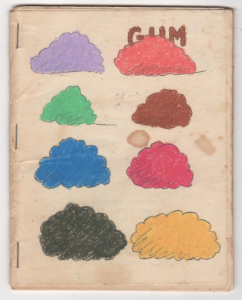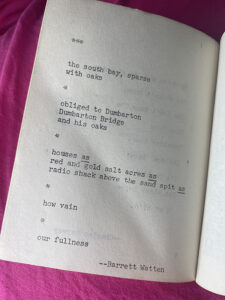Thanks to the online research of C.V. Henriette, I now have a visual record of my second appearance in a literary magazine, Gum 2, ed. Dave Morice (Iowa City, September 1971). Morice’s goal as editor was to be small and sustainable—in both aesthetic and material terms—a reflection on the political economy of poetry at the time and a counter-cultural alternative. A protominimalism, at the intersection of concrete poetry, midwestern imagism, the New York school, and the not-yet-named Language school (as well as a first instance of “actualism,” the movement that was not one) was the result. The poem was written, likely, at Berkeley under the influence of Robert Grenier, and I gave a copy to Dave after I met him in Iowa City. No title, no capitalization, no regular stanzas, no persona, no narrative, but with the use of asterisks in the mode of Ted Berrigan, Anne Waldman, and later Anselm Hollo.
“obliged to Dumbarton / Dumbarton Bridge / and his oaks” is a triangular pun on the Dumbarton Bridge, a relic of the times and one of the most ungainly bridges ever, crossing the southern San Francisco Bay, and Dumbarton Oaks, the site of the Dumbarton Oaks Conference, the progenitor of the United Nations. Also, there are many oaks in the South Bay, as the poem notes.
In the late summer and early fall of 1944, at the height of the Second World War, a series of important diplomatic meetings took place at Dumbarton Oaks, officially known as the Washington Conversations on International Peace and Security Organization. Delegations from China, the Soviet Union, the United Kingdom, and the United States deliberated over proposals for the establishment of an organization to maintain peace and security in the world. Their meetings resulted in the United Nations Charter that was adopted in San Francisco in 1945. [Wikipedia]
What interests me now, apart from the language-centered minimalism, are two things. First is the destruction of metaphor, the three-times repeated use of “as” as inconsequential and leading nowhere, a form of circular or premature or wishful thinking. The poet refuses metaphor as any final horizon of the poem or its interpretation, putting paid to one view (the wrong one) of the romantics. The destruction of metaphor (simile to be precise) connects to the moral close: “how vain / our fullness.” There isn’t a whole or a totality to be named or relied upon. How strange that the universality of the United Nations was formulated at such a place as Dumbarton Oaks, and how odd that a rusting iron bridge in the South Bay bears the same name. The eternal oaks can only endure such nominalism, and yet even they are being summoned without any evidence of direct perception. Above all, the poem is an attack on the image, and imagism. The question of language is really the deferred horizon of comprehension, and we still don’t know how it will turn out.
 As for Dave Morice: check his page at Wikipedia, an impressive contribution to the midwestern avant-garde. And a nicer guy you would never hope to meet. Chuck Miller, my first poetry friend in Iowa City, Beat poet and ex-con—about whom much also will be written—is named on the title page with the mailing address. The journal itself—measuring 00″ x 00″ [t/k]—bears a multi-colored image of clouds as gumballs, both primitive and minimal. That would sum up the “period style” of this work—a total rejection of the muscular, industrial aesthetics that were sending B-52s over North Vietnam, raining down destruction. Here in Iowa it is otherwise, as gumball clouds ascend. Much like the dreamlike inconsequence of the first poems I wanted “out there” (see below), this is a record of poetic self-canceling that would leave everything undisturbed, undamaged, still potential.
As for Dave Morice: check his page at Wikipedia, an impressive contribution to the midwestern avant-garde. And a nicer guy you would never hope to meet. Chuck Miller, my first poetry friend in Iowa City, Beat poet and ex-con—about whom much also will be written—is named on the title page with the mailing address. The journal itself—measuring 00″ x 00″ [t/k]—bears a multi-colored image of clouds as gumballs, both primitive and minimal. That would sum up the “period style” of this work—a total rejection of the muscular, industrial aesthetics that were sending B-52s over North Vietnam, raining down destruction. Here in Iowa it is otherwise, as gumball clouds ascend. Much like the dreamlike inconsequence of the first poems I wanted “out there” (see below), this is a record of poetic self-canceling that would leave everything undisturbed, undamaged, still potential.
Notes
1968
“going forth” and “cambodian wastes.” Cloud Marauder 4 (ed. David Bullen et al.): 44–45.1970
“the south bay, sparse . . .” Gum (ed. Dave Morice) 2: n.p.1971
“birds of winter.” This (ed. BW and Robert Grenier) 2: 50–56.
“radio day in Soma City”; “tiny tomorrows”; “ode to Bourbaki.” This 1: 70–73.
“tunnel vicious.” Search for Tomorrow (ed. George Mattingly) 2: n.p.1972
“invasion / on the coastline??,” “Music,” and “Tired Ducks.” tottel’s (ed. Ron Silli-man) 8: n.p.
“the moon is in the fan . . .” and “Natura Morta.” L (ed. Curtis Faville) 1, no. 1: 12–13.
“to”; “white yellow”; “things to come”; complaint”; “so”; “warmer”; “all dreams of crazy machine . . .”; “Flying A”; “how water piles on top . . . .” This (ed. BW and Robert Grenier) 3: 70–73.













